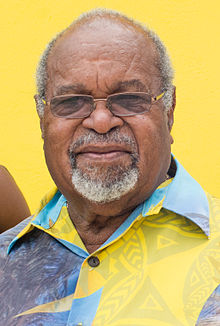Sir Michael Somare | |
|---|---|
 Somare in 2014 | |
| 1st Prime Minister of Papua New Guinea | |
| In office 17 January 2011 – 4 April 2011 | |
| Monarch | Elizabeth II |
| Governor General | Michael Ogio |
| Preceded by | Sam Abal (acting) |
| Succeeded by | Sam Abal (acting) |
| In office 5 August 2002 – 13 December 2010 | |
| Monarch | Elizabeth II |
| Governors General |
|
| Preceded by | Mekere Morauta |
| Succeeded by | Sam Abal (acting) |
| In office 2 August 1982 – 21 November 1985 | |
| Monarch | Elizabeth II |
| Governors General | |
| Preceded by | Julius Chan |
| Succeeded by | Paias Wingti |
| In office 16 September 1975 – 11 March 1980 | |
| Monarch | Elizabeth II |
| Governors General |
|
| Preceded by | Himself (as Chief Minister) |
| Succeeded by | Julius Chan |
| Personal details | |
| Born | Michael Thomas Somare 9 April 1936 Rabaul, New Guinea, Australia |
| Died | 26 February 2021 (aged 84) Port Moresby, National Capital District, Papua New Guinea |
| Citizenship |
|
| Nationality | Papua New Guinean |
| Political party |
|
| Spouse | |
| Children | 5, including Arthur |
Sir Michael Thomas Somare GCL GCMG CH CF SSI KStJ KSG PC (9 April 1936 – 25 February 2021) was a Papua New Guinean politician. Widely called the "father of the nation" (Tok Pisin: papa blo kantri), he was the first Prime Minister after independence. At the time of his death, Somare was also the longest-serving prime minister, having been in office for 17 years over three separate terms: from 1975 to 1980; from 1982 to 1985; and from 2002 to 2011. His political career spanned from 1968 until his retirement in 2017. Besides serving as PM, he was minister of foreign affairs, leader of the opposition and governor of East Sepik Province.
He served in a variety of positions. His base was not primarily in political parties but in East Sepik Province, the area that elected him. During his political career he was a member of the House of Assembly and after independence in 1975 the National parliament for the East Sepik Provincial – later open – seat. He was the first chief minister at the end of colonial rule. Thereafter he became the first Prime Minister after independence from 1975 to 1980. He returned to the office of Prime Minister from 1982 to 1985, and his longest stint in the position was from 2002 to 2011. He also served as Cabinet Minister: he was minister of foreign affairs from 1988 to 1992; from 1999 to 2001 he was subsequently minister of foreign affairs, minister of mining and Bougainville, minister of foreign affairs and Bougainville affairs. He was leader of the opposition from 1968 to 1972, from 1980 to 1982, and thereafter in that position from 1985 to 1988,[1] from 1992 to 1993, and finally from 2001 to 2002. When the new position of political governor as head of the provincial administration and representative MP was created in 1995, Somare took up the job. He was governor of East Sepik from 1995 until 1999. After the last election that he contended, he again became Governor of East Sepik (2012–2016). He was a founding member of the Pangu Party which led PNG into independence in 1975. He resigned from the Pangu Party and became an independent in 1988. He rejoined the Pangu Party in 1994 but was sacked as a leader in the following year. He was then asked to join and lead the National Alliance Party. In 2017 he left politics and also the National Alliance Party.[2]
While Somare was in March 2011 hospitalised in Singapore, a majority of parliamentarians declared the post of Prime Minister vacant. Peter O'Neill was the new prime minister.[3] This was contested. On 12 December 2011, the Supreme Court of Papua New Guinea ordered that Somare be reinstated as Prime Minister, ruling that O'Neill had not been lawfully appointed.[4] This event triggered the 2011–12 Papua New Guinean constitutional crisis. Following a decisive victory for O'Neill in the 2012 general election, Somare expressed support for him, thereby ending the crisis and forming a coalition government. However, this truce did not last. When Somare announced his departure from politics, he made a blistering attack on O'Neill.[5][6]
- ^ "PAPUA NEW GUINEA (National Parliament)". 23 September 2023. Archived from the original on 23 September 2023.
- ^ "Hon. Michael Somare, MP – Ninth Parliament of Papua New Guinea". www.parliament.gov.pg.
- ^ "PNG's new prime minister: Peter O'Neill". East Asia Forum. 11 August 2011. Retrieved 29 November 2022.
- ^ "PNG Supreme Court rules O'Neill election illegal, orders Somare reinstatement". Radio New Zealand International. 12 December 2011. Retrieved 12 December 2011.
- ^ "PNG's new prime minister: Peter O'Neill". East Asia Forum. 11 August 2011. Retrieved 29 November 2022.
- ^ "Papua New Guinea prime minister Peter O'Neill must resign, say former leaders". the Guardian. 20 July 2016. Retrieved 29 November 2022.